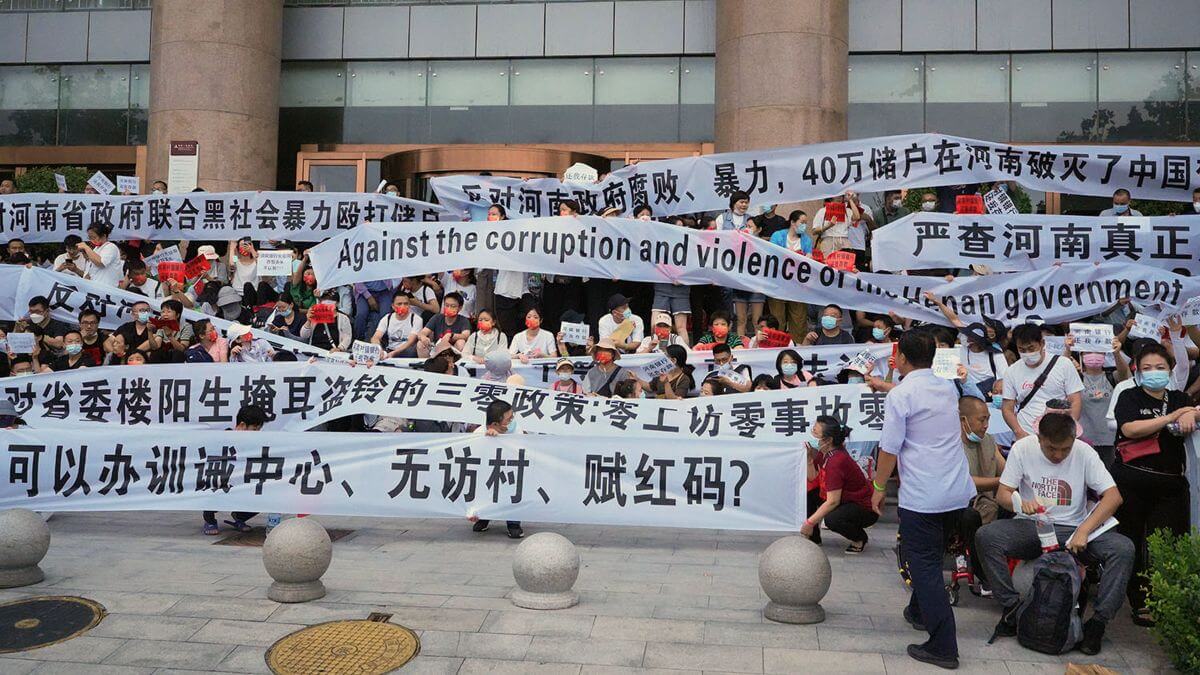Authorities in China’s Henan and Anhui provinces assured voters on Monday that they would begin making repayments to citizens on behalf of rural banks in the aftermath of violent protests on Sunday over $1.5 billion in frozen assets.
In a joint statement, the local banking and insurance regulator and financial regulatory bureau of the provinces in eastern China announced that the payments will be released in batches, with the first due this Friday.
This is huge. Don't know how this will end. Henan bank is NOT the only one that is having problems with liquidity. All four Chinese banks are having the same issue. Some depositors found they can save and can NOT withdraw money with their bank cards. #bankrun #China #CCP pic.twitter.com/5WYYgpmIWP
— Jennifer Zeng 曾錚 (@jenniferatntd) July 10, 2022
Chinese state-owned media house Global Times (GT) reported that the first batch will target customers whose total funds fall within the limit of $7,440 or less, while those whose deposit amounts exceed $7,440 will be paid back “shortly afterward.”
The announcement from the local regulator came after almost a thousand people gathered outside the People’s Bank of China in the provincial capital of Zhengzhou and demanded action. The rare protest turned violent despite the presence of police forces at the venue, who asked people to leave. Footage from the incident showed a group of unidentified men, believed to be law enforcement, dressed in plain-clothes, manhandling protesters and throwing water bottles at them.
The local govt. used plain clothes/suppressed the protest. Highly censored only in private chat groups people got some news of it
— Liqian Ren (@liqian_ren) July 10, 2022
This was depositors' 4th protest. likely continue until central and local govt reached agreement who pays how much share.
/4https://t.co/4fh4GNbdqj
According to GT, anger began to swell as far back as April 18, when depositors complained that they were unable to withdraw funds from the New Oriental Country Bank of Kaifeng, the Zhecheng Huanghuai Community Bank, the Shangcai Huimin County Bank, and the Yuzhou Xin Min Sheng Village Bank.
Moreover, some citizens reported that they were also barred from making a trip to Zhengzhou to report the issue because their digital health codes had turned red. Beijing utilises the codes as a preventive measure to control the spread of COVID-19, as the codes help in tracking people’s travel and COVID-19 nucleic acid test information. In order to avail public services and transportation in most cities, Chinese citizens are required to present a green health code taken within the past 48-72 hours.
Crackdown on massive bank protests in Henan. 400,000 people can’t access their bank accounts. $6 billion dollars is on the line. #china #henan #Henanbankcrisis pic.twitter.com/eGSn2VVydQ
— China Uncensored (@ChinaUncensored) July 11, 2022
This led some citizens to speculate that the health code system had been hacked to prevent them from visiting the bank or even the Henan province, while others have suggested that the change was made by provincial authorities in order to prevent protests.
Chinese media has reported that the frozen deposits could be worth up to $1.5 billion. Authorities are currently carrying out an investigation for possible fraud and the Henan police have arrested some suspects who have been accused of controlling a number of the province’s banks through a group company.
Protest of depositors who have lost access to their bank accounts funds in local banks
— Nin Of Things to Come (@Ninnd123) July 11, 2022
Henan province China pic.twitter.com/pNaa9HmAYu
According to GT, the suspects gathered deposits from people by using “third-party financial product platforms,” as well as “a firm they set up themselves to sell other financial products. “They then made fictitious loans as a way to illegally transfer the funds,” the media house said.
To this end, Henan authorities filed a case against the Henan New Wealth Group for “accessing and manipulating the online trading systems of the Yuzhou Xin Minsheng Village Bank and three other rural lenders.” Xuchang police have also arrested a number of suspects and frozen their assets.
Michael Pettis, a professor of finance at Peking University, told The Guardian that the incident is a “very worrying reminder” that “any long period of soaring real-estate prices and explosive growth in debt creates powerful incentives for excessive risk-taking and even fraud.”
It has also raised severe concerns about the fragility of the Chinese banking system.

